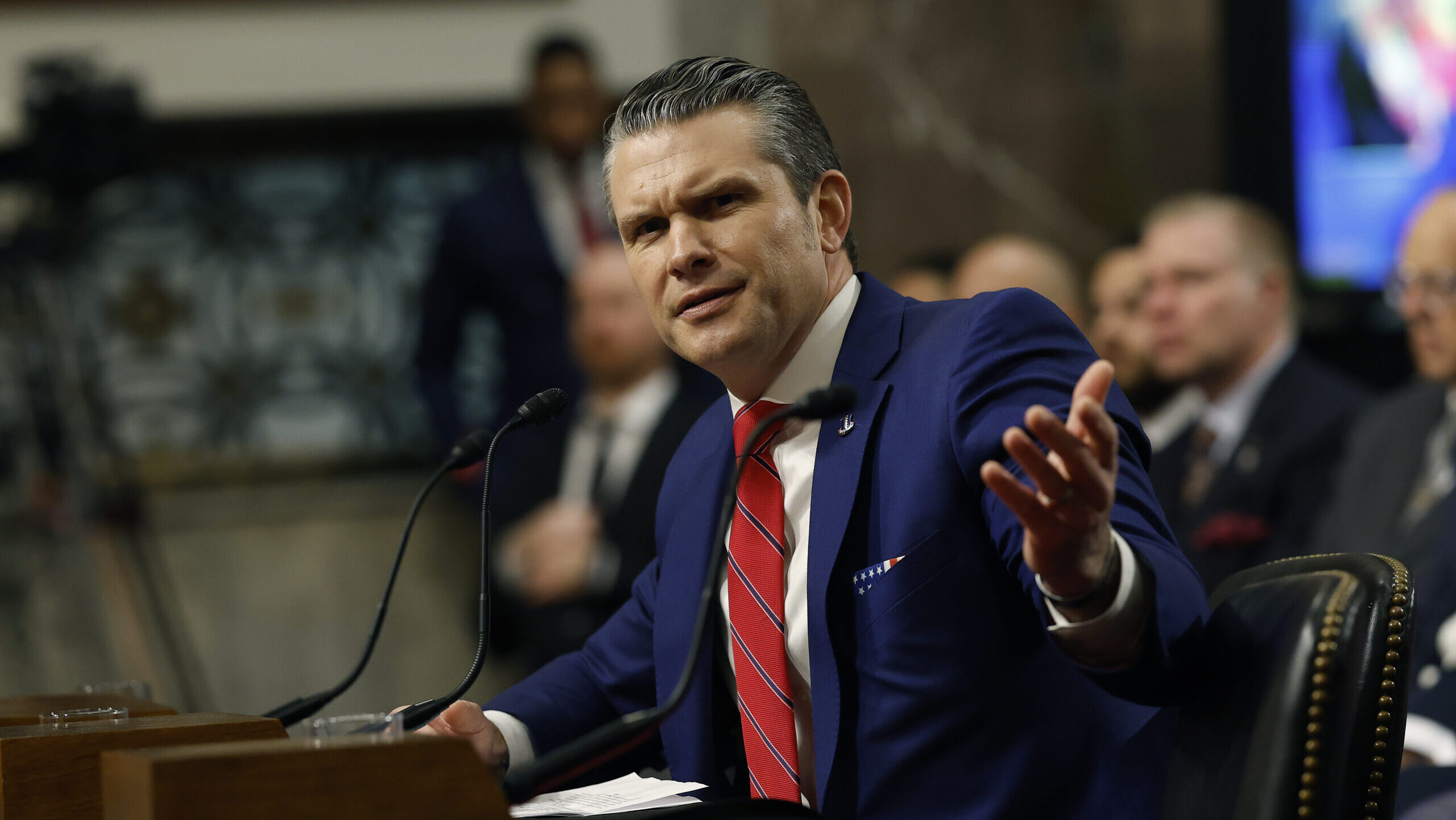
A heated dispute erupted during a House Armed Services Committee session on Tuesday as Democrats sought to hold Defense Secretary Pete Hegseth accountable for a series of scandals, only to be repeatedly blocked by Republicans.
The efforts to address alleged misconduct and operational concerns at the Pentagon coincided with debate over a sweeping $150 billion military spending measure, a central component of the GOP’s broader reconciliation package.
The measure under consideration is part of a push by Republican lawmakers to reshape federal spending priorities, significantly boosting military funding while slashing resources for numerous civilian programs.
If approved in full, the reconciliation bill would increase total defense expenditures to more than $1 trillion when added to the already authorized $886 billion base budget for fiscal year 2025.
Although billed as a historic national security investment by Republican leadership, the markup of the bill was overtaken by growing Democratic frustrations with Secretary Hegseth’s conduct and performance.
Democrats introduced more than 20 amendments designed to either limit funding, impose conditions on spending, or remove Hegseth from his position altogether. Every single effort was rejected by the Republican majority on the panel.
Committee Ranking Member Adam Smith, a Democrat from Washington, opened the session with a scathing critique of the Trump administration’s defense leadership, casting doubt on the Pentagon’s capacity to manage such a massive funding increase.
“They have not even begun to prove that there is a chance in hell that they will spend this money intelligently, efficiently and effectively,” Smith said. “Secretary Hegseth has proven himself to be completely incapable of doing the job of secretary of Defense.”

Representative Marilyn Strickland, also from Washington, echoed Smith’s frustration and questioned the integrity of the process. “The fact that Hegseth is still in his role is a joke,” she said. “At some point, you have to speak to the American people.”
Another Democrat, Representative Seth Moulton of Massachusetts, warned against providing unchecked authority to Hegseth. “We should not give Pete Hegseth a $150 billion blank check. Heck, I wouldn’t trust the secretary with 20 bucks,” he said, drawing murmurs from colleagues and attendees alike.
Much of the criticism centered around Hegseth’s use of the encrypted messaging platform Signal to relay sensitive military information, including airstrike plans against Houthi targets in Yemen.
According to multiple reports, the communications were shared not only with military personnel but also with Hegseth’s wife, brother, personal attorney, and mistakenly with a journalist who was part of a separate chat group involving national security officials.
These disclosures have raised significant concerns within Congress over the Pentagon’s operational security and its adherence to classification guidelines.
Smith offered an amendment that would have restricted 75 percent of the proposed $150 billion in new funding until Hegseth completed a comprehensive review of the department’s classification and information security protocols. The amendment was rejected.
Representative Pat Ryan of New York proposed a pair of amendments aimed at curbing the Defense Secretary’s influence and limiting potential conflicts of interest. One measure sought to reduce Hegseth’s government salary, while the other would have prohibited reconciliation funds from being awarded to any company employing special government employees.
This was widely interpreted as an attempt to curtail influence by billionaire Elon Musk, whose government contracting role and involvement in the Department of Government Efficiency (DOGE) have raised ethical concerns.

Representative Chrissy Houlahan of Pennsylvania introduced an amendment that would have effectively killed the entire bill until Hegseth resigned or was removed from office.
Meanwhile, another Democratic proposal called for a written justification of Hegseth’s controversial decision in February to dismiss General CQ Brown, the former Chairman of the Joint Chiefs of Staff.
Beyond Hegseth’s conduct, Democrats raised alarms over the strategic direction of the military under the Trump administration. Representative Mikie Sherrill of New Jersey submitted an amendment to prevent the Defense Department from consolidating U.S.
European Command and Africa Command, amid fears that the administration might use structural reshuffling to justify troop drawdowns or reductions in regional military support.
These efforts were met with near-total silence from Republican members of the committee, who did not engage in public debate over Hegseth’s qualifications or behavior. None of the Democratic amendments received bipartisan support, and none were adopted. The panel ultimately approved the defense reconciliation measure in a 35 to 21 vote.
Despite the partisan divide, five Democrats broke ranks and voted with Republicans to advance the bill. Those members were Representatives Jared Golden of Maine, Gabe Vazquez of New Mexico, Don Davis of North Carolina, George Whitesides of California, and Eugene Vindman of Virginia. Their votes provided a measure of bipartisan legitimacy to the defense package, though the broader debate reflected deep divisions over both policy and leadership.
The spending proposal itself includes substantial investments in several high-priority areas for the Trump administration. Among the allocations are $33.7 billion for shipbuilding programs, nearly $25 billion for the long-discussed Golden Dome missile defense system, $12.9 billion for nuclear deterrence initiatives, and $11.1 billion to support force posture in the Indo-Pacific region.
Additional funds include almost $9 billion for quality-of-life improvements for service members and their families, and $5 billion for enhanced border security measures.

Republicans have touted the measure as a once-in-a-generation opportunity to reinvest in American military dominance. Committee Chair Mike Rogers of Alabama described the markup session as a “historic day” and emphasized that the proposal would make a lasting impact on U.S. national defense.
But Democrats remain skeptical. They argue that expanding the Pentagon’s budget under current leadership, without greater oversight and accountability, could result in waste, mismanagement, and strategic missteps.
The use of the reconciliation process — typically reserved for budget and fiscal matters — to pass such a sweeping defense initiative was also a point of contention, with critics arguing it bypasses normal legislative scrutiny.
As the legislation now moves to the full House for further consideration, debate is expected to intensify. Once the House acts on the measure, it must be reconciled with a Senate version of the package before final approval. Given the complexity and scale of the proposed spending, lawmakers anticipate a contentious negotiation period in the weeks ahead.
The defense funding plan is part of a broader reconciliation package that seeks to implement President Trump’s legislative priorities, including cuts to domestic spending, tax reform, and a restructuring of several federal agencies.
While Republicans argue that the plan aligns resources with national needs, Democrats view the bill as disproportionately favoring defense contractors and military expansion at the expense of health care, education, environmental protection, and other vital services.
The standoff over Pete Hegseth’s leadership at the Pentagon is likely to continue as new revelations and accountability efforts emerge. For now, however, the administration appears to have the political backing it needs to push forward with its vision for American defense — even as concerns about security breaches, miscommunication, and a lack of transparency continue to mount.

Whether the Senate will be as willing to support such a dramatic increase in military spending under these circumstances remains to be seen. The next chapter of this legislative battle will unfold in both chambers of Congress, where voices on both sides of the aisle are preparing for a larger fight over the future of American security and the stewardship of its vast defense resources.



